A Comprehensive Report: Integrated Professional Skills in Digital Age
VerifiedAdded on 2021/02/19
|11
|3102
|25
Report
AI Summary
This report delves into the realm of integrated professional skills within the digital age, analyzing the multifaceted impact of the internet on both businesses and society. It meticulously compares and contrasts the positive and negative aspects of internet usage, exploring its influence on marketing, communication, and customer relations, while also addressing the societal impacts on communication, community building, and potential drawbacks like loss of human connection and security threats. The report further identifies and discusses the significant threats faced by organizations and society, including security and privacy concerns, vulnerabilities in technology, and the dangers posed by viruses. It then pivots to a comparative analysis of two leading unified communication providers, British Telecom and Vodafone, evaluating their features, applications, and suitability for different business needs. The report concludes by synthesizing the key findings and offering insights into navigating the digital landscape effectively.
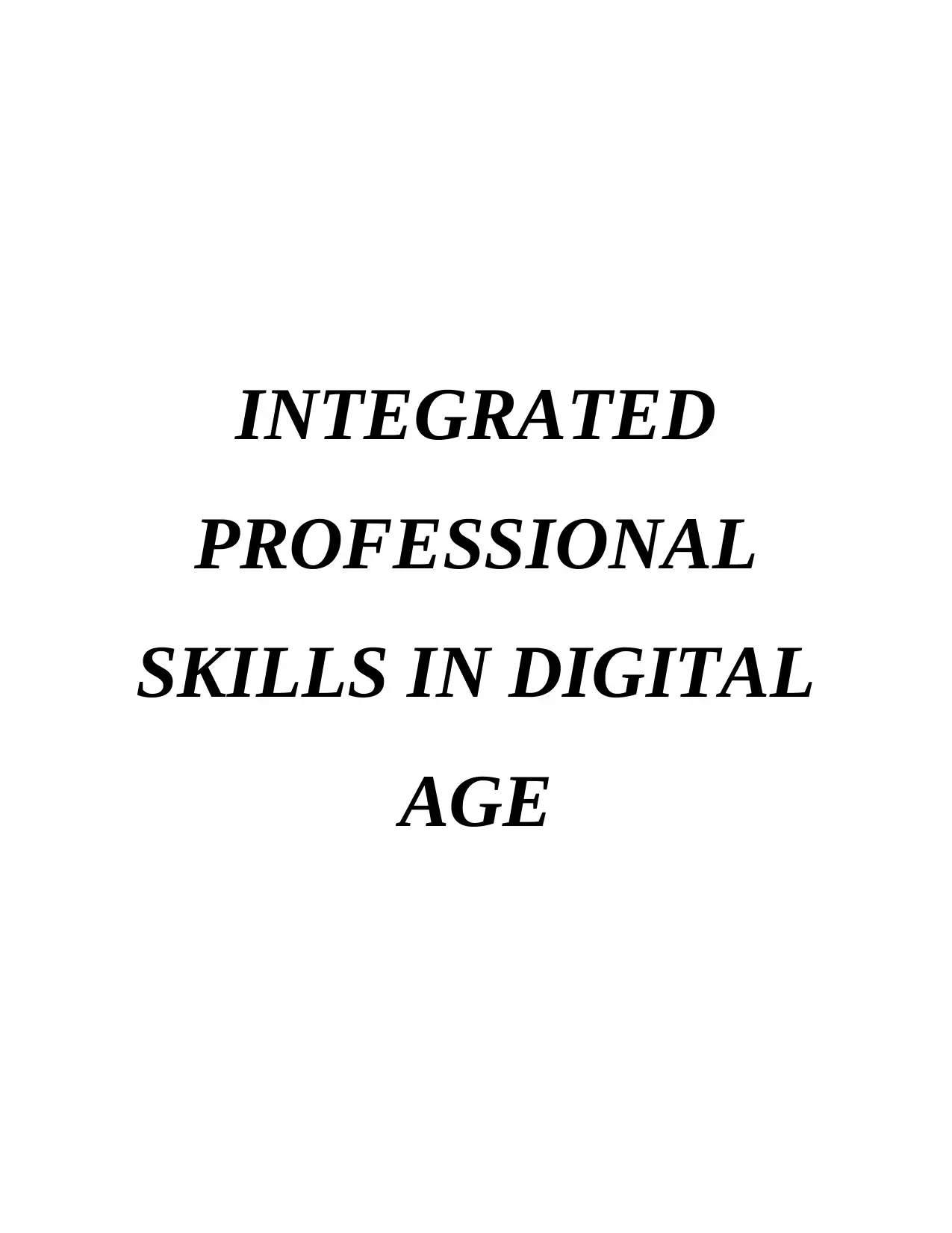
INTEGRATED
PROFESSIONAL
SKILLS IN DIGITAL
AGE
PROFESSIONAL
SKILLS IN DIGITAL
AGE
Paraphrase This Document
Need a fresh take? Get an instant paraphrase of this document with our AI Paraphraser
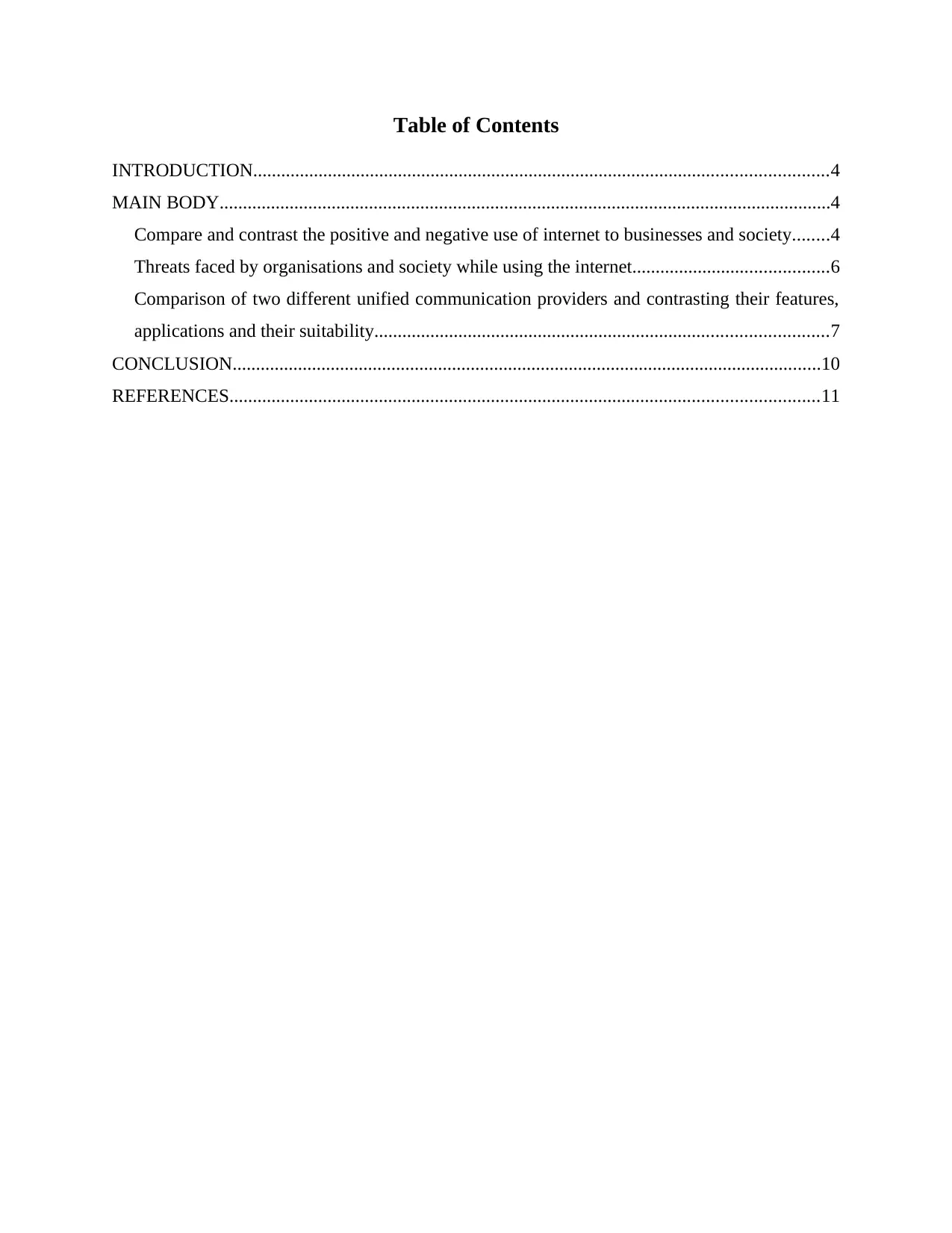
Table of Contents
INTRODUCTION...........................................................................................................................4
MAIN BODY...................................................................................................................................4
Compare and contrast the positive and negative use of internet to businesses and society........4
Threats faced by organisations and society while using the internet..........................................6
Comparison of two different unified communication providers and contrasting their features,
applications and their suitability.................................................................................................7
CONCLUSION..............................................................................................................................10
REFERENCES..............................................................................................................................11
INTRODUCTION...........................................................................................................................4
MAIN BODY...................................................................................................................................4
Compare and contrast the positive and negative use of internet to businesses and society........4
Threats faced by organisations and society while using the internet..........................................6
Comparison of two different unified communication providers and contrasting their features,
applications and their suitability.................................................................................................7
CONCLUSION..............................................................................................................................10
REFERENCES..............................................................................................................................11

⊘ This is a preview!⊘
Do you want full access?
Subscribe today to unlock all pages.

Trusted by 1+ million students worldwide
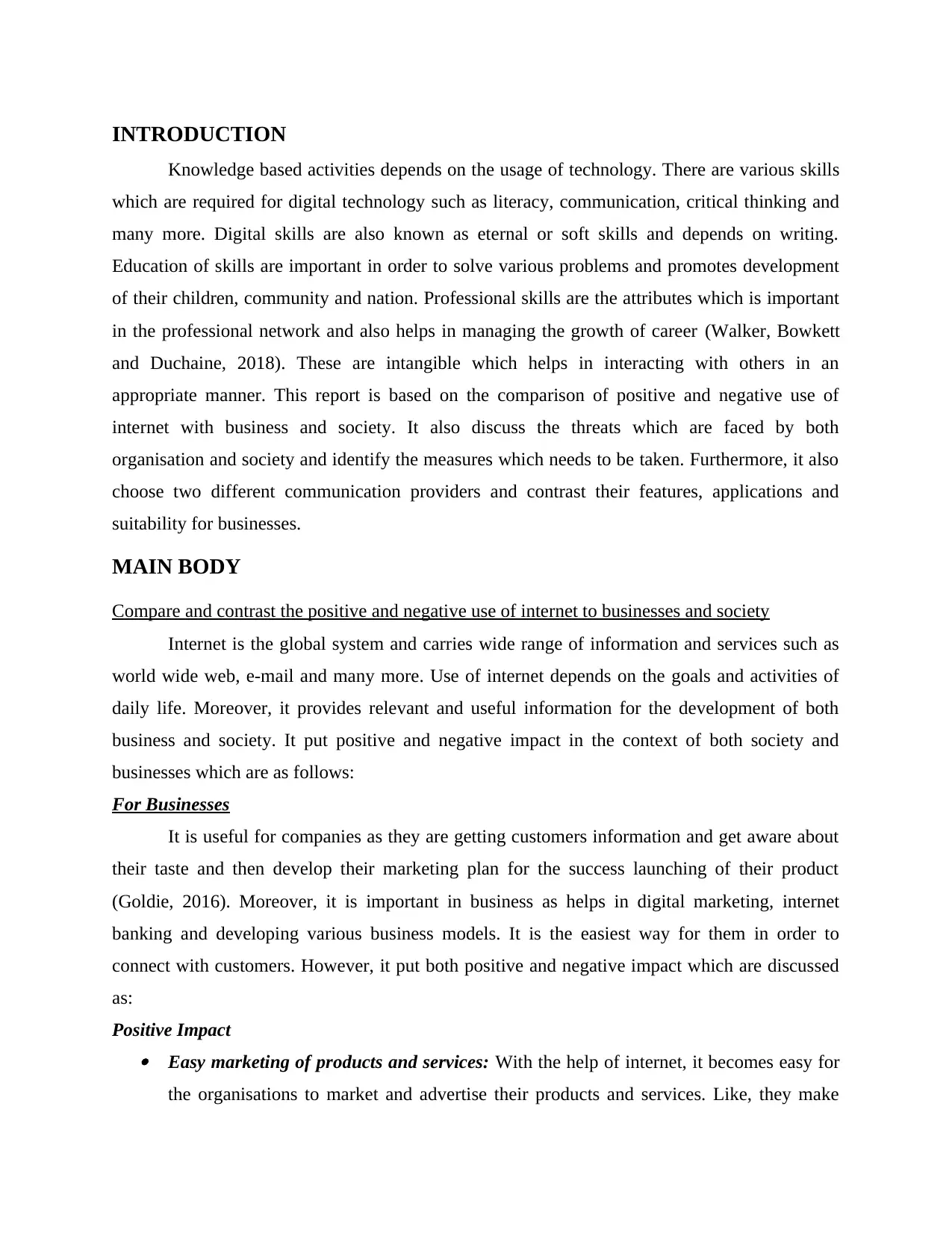
INTRODUCTION
Knowledge based activities depends on the usage of technology. There are various skills
which are required for digital technology such as literacy, communication, critical thinking and
many more. Digital skills are also known as eternal or soft skills and depends on writing.
Education of skills are important in order to solve various problems and promotes development
of their children, community and nation. Professional skills are the attributes which is important
in the professional network and also helps in managing the growth of career (Walker, Bowkett
and Duchaine, 2018). These are intangible which helps in interacting with others in an
appropriate manner. This report is based on the comparison of positive and negative use of
internet with business and society. It also discuss the threats which are faced by both
organisation and society and identify the measures which needs to be taken. Furthermore, it also
choose two different communication providers and contrast their features, applications and
suitability for businesses.
MAIN BODY
Compare and contrast the positive and negative use of internet to businesses and society
Internet is the global system and carries wide range of information and services such as
world wide web, e-mail and many more. Use of internet depends on the goals and activities of
daily life. Moreover, it provides relevant and useful information for the development of both
business and society. It put positive and negative impact in the context of both society and
businesses which are as follows:
For Businesses
It is useful for companies as they are getting customers information and get aware about
their taste and then develop their marketing plan for the success launching of their product
(Goldie, 2016). Moreover, it is important in business as helps in digital marketing, internet
banking and developing various business models. It is the easiest way for them in order to
connect with customers. However, it put both positive and negative impact which are discussed
as:
Positive Impact Easy marketing of products and services: With the help of internet, it becomes easy for
the organisations to market and advertise their products and services. Like, they make
Knowledge based activities depends on the usage of technology. There are various skills
which are required for digital technology such as literacy, communication, critical thinking and
many more. Digital skills are also known as eternal or soft skills and depends on writing.
Education of skills are important in order to solve various problems and promotes development
of their children, community and nation. Professional skills are the attributes which is important
in the professional network and also helps in managing the growth of career (Walker, Bowkett
and Duchaine, 2018). These are intangible which helps in interacting with others in an
appropriate manner. This report is based on the comparison of positive and negative use of
internet with business and society. It also discuss the threats which are faced by both
organisation and society and identify the measures which needs to be taken. Furthermore, it also
choose two different communication providers and contrast their features, applications and
suitability for businesses.
MAIN BODY
Compare and contrast the positive and negative use of internet to businesses and society
Internet is the global system and carries wide range of information and services such as
world wide web, e-mail and many more. Use of internet depends on the goals and activities of
daily life. Moreover, it provides relevant and useful information for the development of both
business and society. It put positive and negative impact in the context of both society and
businesses which are as follows:
For Businesses
It is useful for companies as they are getting customers information and get aware about
their taste and then develop their marketing plan for the success launching of their product
(Goldie, 2016). Moreover, it is important in business as helps in digital marketing, internet
banking and developing various business models. It is the easiest way for them in order to
connect with customers. However, it put both positive and negative impact which are discussed
as:
Positive Impact Easy marketing of products and services: With the help of internet, it becomes easy for
the organisations to market and advertise their products and services. Like, they make
Paraphrase This Document
Need a fresh take? Get an instant paraphrase of this document with our AI Paraphraser
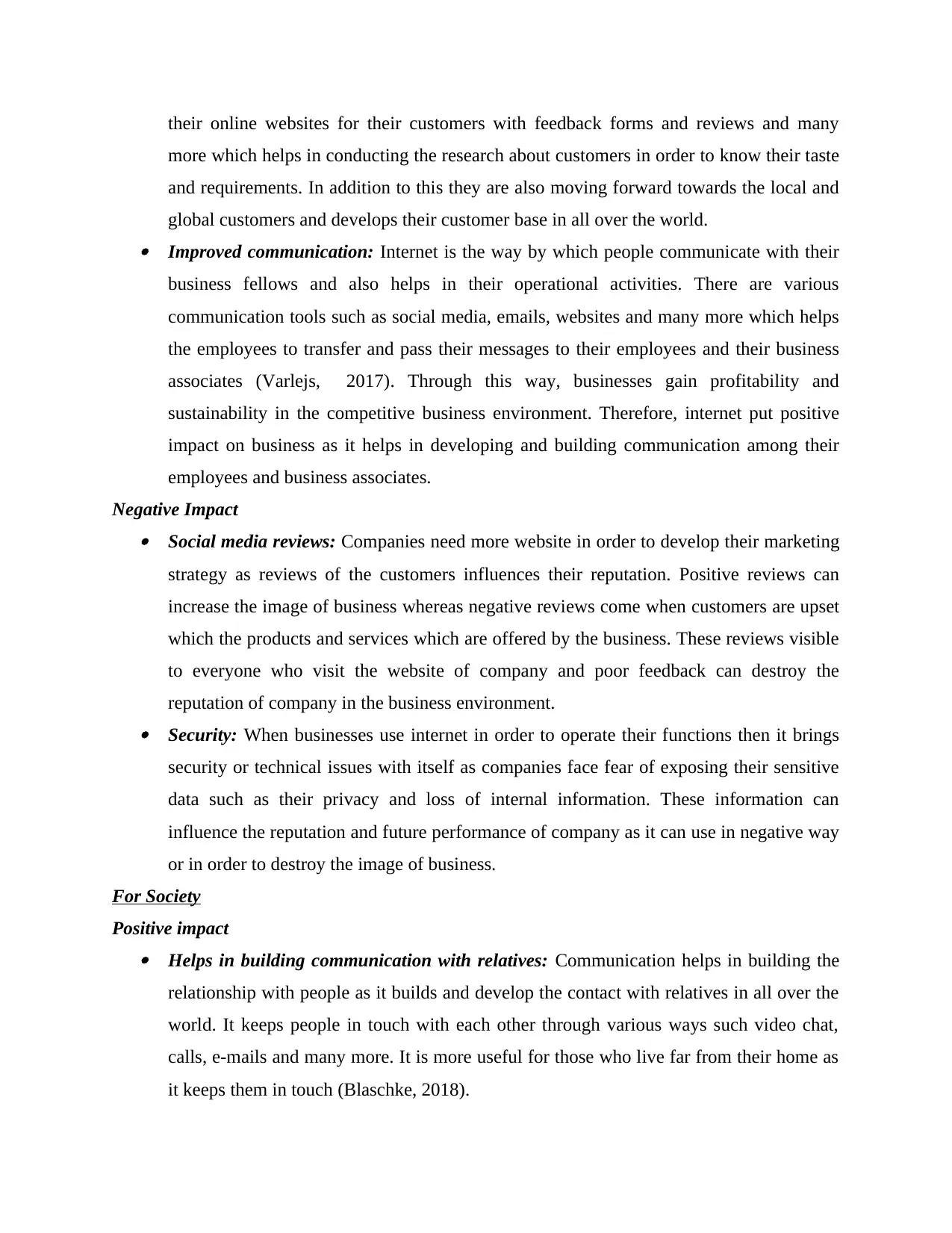
their online websites for their customers with feedback forms and reviews and many
more which helps in conducting the research about customers in order to know their taste
and requirements. In addition to this they are also moving forward towards the local and
global customers and develops their customer base in all over the world. Improved communication: Internet is the way by which people communicate with their
business fellows and also helps in their operational activities. There are various
communication tools such as social media, emails, websites and many more which helps
the employees to transfer and pass their messages to their employees and their business
associates (Varlejs, 2017). Through this way, businesses gain profitability and
sustainability in the competitive business environment. Therefore, internet put positive
impact on business as it helps in developing and building communication among their
employees and business associates.
Negative Impact Social media reviews: Companies need more website in order to develop their marketing
strategy as reviews of the customers influences their reputation. Positive reviews can
increase the image of business whereas negative reviews come when customers are upset
which the products and services which are offered by the business. These reviews visible
to everyone who visit the website of company and poor feedback can destroy the
reputation of company in the business environment. Security: When businesses use internet in order to operate their functions then it brings
security or technical issues with itself as companies face fear of exposing their sensitive
data such as their privacy and loss of internal information. These information can
influence the reputation and future performance of company as it can use in negative way
or in order to destroy the image of business.
For Society
Positive impact Helps in building communication with relatives: Communication helps in building the
relationship with people as it builds and develop the contact with relatives in all over the
world. It keeps people in touch with each other through various ways such video chat,
calls, e-mails and many more. It is more useful for those who live far from their home as
it keeps them in touch (Blaschke, 2018).
more which helps in conducting the research about customers in order to know their taste
and requirements. In addition to this they are also moving forward towards the local and
global customers and develops their customer base in all over the world. Improved communication: Internet is the way by which people communicate with their
business fellows and also helps in their operational activities. There are various
communication tools such as social media, emails, websites and many more which helps
the employees to transfer and pass their messages to their employees and their business
associates (Varlejs, 2017). Through this way, businesses gain profitability and
sustainability in the competitive business environment. Therefore, internet put positive
impact on business as it helps in developing and building communication among their
employees and business associates.
Negative Impact Social media reviews: Companies need more website in order to develop their marketing
strategy as reviews of the customers influences their reputation. Positive reviews can
increase the image of business whereas negative reviews come when customers are upset
which the products and services which are offered by the business. These reviews visible
to everyone who visit the website of company and poor feedback can destroy the
reputation of company in the business environment. Security: When businesses use internet in order to operate their functions then it brings
security or technical issues with itself as companies face fear of exposing their sensitive
data such as their privacy and loss of internal information. These information can
influence the reputation and future performance of company as it can use in negative way
or in order to destroy the image of business.
For Society
Positive impact Helps in building communication with relatives: Communication helps in building the
relationship with people as it builds and develop the contact with relatives in all over the
world. It keeps people in touch with each other through various ways such video chat,
calls, e-mails and many more. It is more useful for those who live far from their home as
it keeps them in touch (Blaschke, 2018).
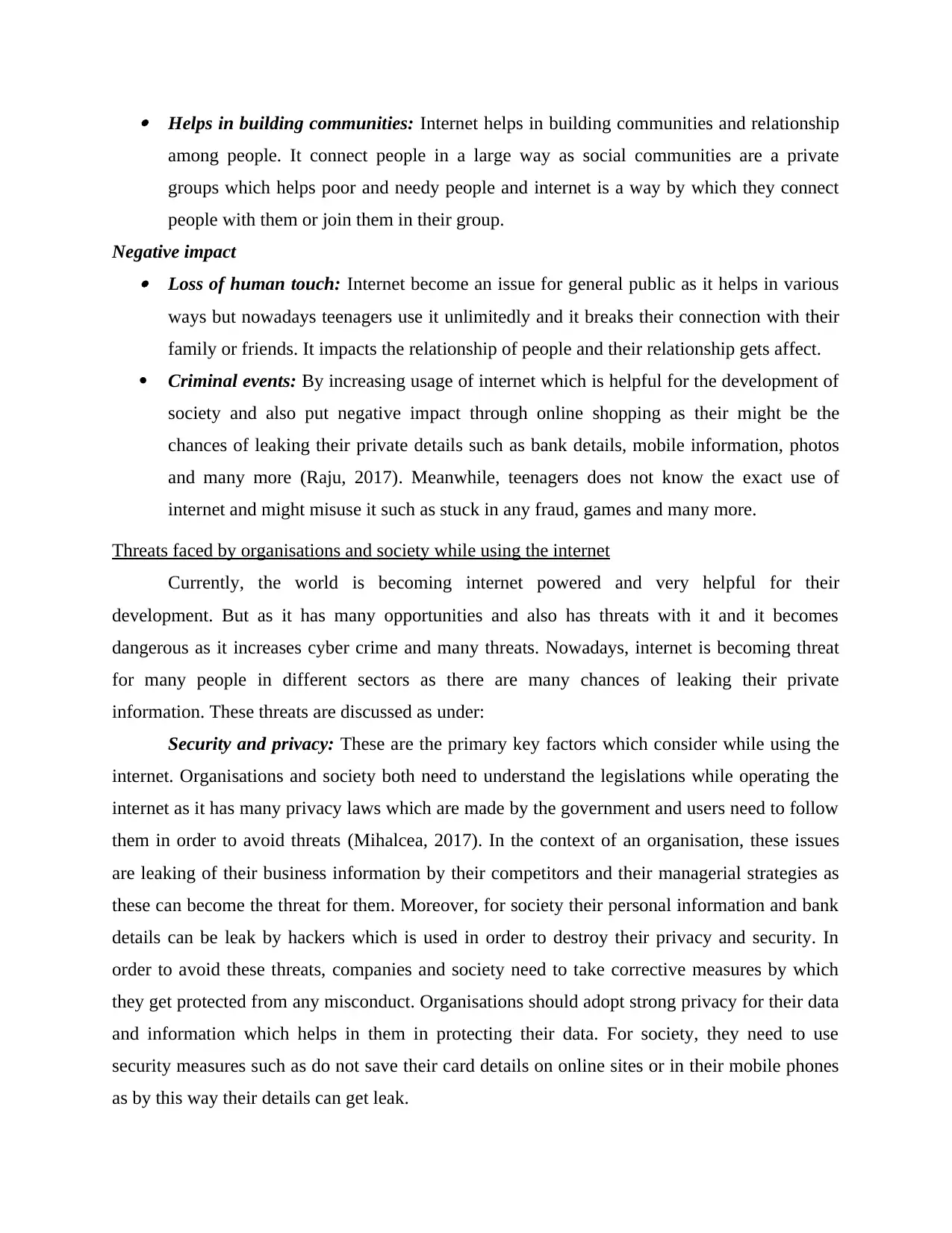
Helps in building communities: Internet helps in building communities and relationship
among people. It connect people in a large way as social communities are a private
groups which helps poor and needy people and internet is a way by which they connect
people with them or join them in their group.
Negative impact Loss of human touch: Internet become an issue for general public as it helps in various
ways but nowadays teenagers use it unlimitedly and it breaks their connection with their
family or friends. It impacts the relationship of people and their relationship gets affect.
Criminal events: By increasing usage of internet which is helpful for the development of
society and also put negative impact through online shopping as their might be the
chances of leaking their private details such as bank details, mobile information, photos
and many more (Raju, 2017). Meanwhile, teenagers does not know the exact use of
internet and might misuse it such as stuck in any fraud, games and many more.
Threats faced by organisations and society while using the internet
Currently, the world is becoming internet powered and very helpful for their
development. But as it has many opportunities and also has threats with it and it becomes
dangerous as it increases cyber crime and many threats. Nowadays, internet is becoming threat
for many people in different sectors as there are many chances of leaking their private
information. These threats are discussed as under:
Security and privacy: These are the primary key factors which consider while using the
internet. Organisations and society both need to understand the legislations while operating the
internet as it has many privacy laws which are made by the government and users need to follow
them in order to avoid threats (Mihalcea, 2017). In the context of an organisation, these issues
are leaking of their business information by their competitors and their managerial strategies as
these can become the threat for them. Moreover, for society their personal information and bank
details can be leak by hackers which is used in order to destroy their privacy and security. In
order to avoid these threats, companies and society need to take corrective measures by which
they get protected from any misconduct. Organisations should adopt strong privacy for their data
and information which helps in them in protecting their data. For society, they need to use
security measures such as do not save their card details on online sites or in their mobile phones
as by this way their details can get leak.
among people. It connect people in a large way as social communities are a private
groups which helps poor and needy people and internet is a way by which they connect
people with them or join them in their group.
Negative impact Loss of human touch: Internet become an issue for general public as it helps in various
ways but nowadays teenagers use it unlimitedly and it breaks their connection with their
family or friends. It impacts the relationship of people and their relationship gets affect.
Criminal events: By increasing usage of internet which is helpful for the development of
society and also put negative impact through online shopping as their might be the
chances of leaking their private details such as bank details, mobile information, photos
and many more (Raju, 2017). Meanwhile, teenagers does not know the exact use of
internet and might misuse it such as stuck in any fraud, games and many more.
Threats faced by organisations and society while using the internet
Currently, the world is becoming internet powered and very helpful for their
development. But as it has many opportunities and also has threats with it and it becomes
dangerous as it increases cyber crime and many threats. Nowadays, internet is becoming threat
for many people in different sectors as there are many chances of leaking their private
information. These threats are discussed as under:
Security and privacy: These are the primary key factors which consider while using the
internet. Organisations and society both need to understand the legislations while operating the
internet as it has many privacy laws which are made by the government and users need to follow
them in order to avoid threats (Mihalcea, 2017). In the context of an organisation, these issues
are leaking of their business information by their competitors and their managerial strategies as
these can become the threat for them. Moreover, for society their personal information and bank
details can be leak by hackers which is used in order to destroy their privacy and security. In
order to avoid these threats, companies and society need to take corrective measures by which
they get protected from any misconduct. Organisations should adopt strong privacy for their data
and information which helps in them in protecting their data. For society, they need to use
security measures such as do not save their card details on online sites or in their mobile phones
as by this way their details can get leak.
⊘ This is a preview!⊘
Do you want full access?
Subscribe today to unlock all pages.

Trusted by 1+ million students worldwide
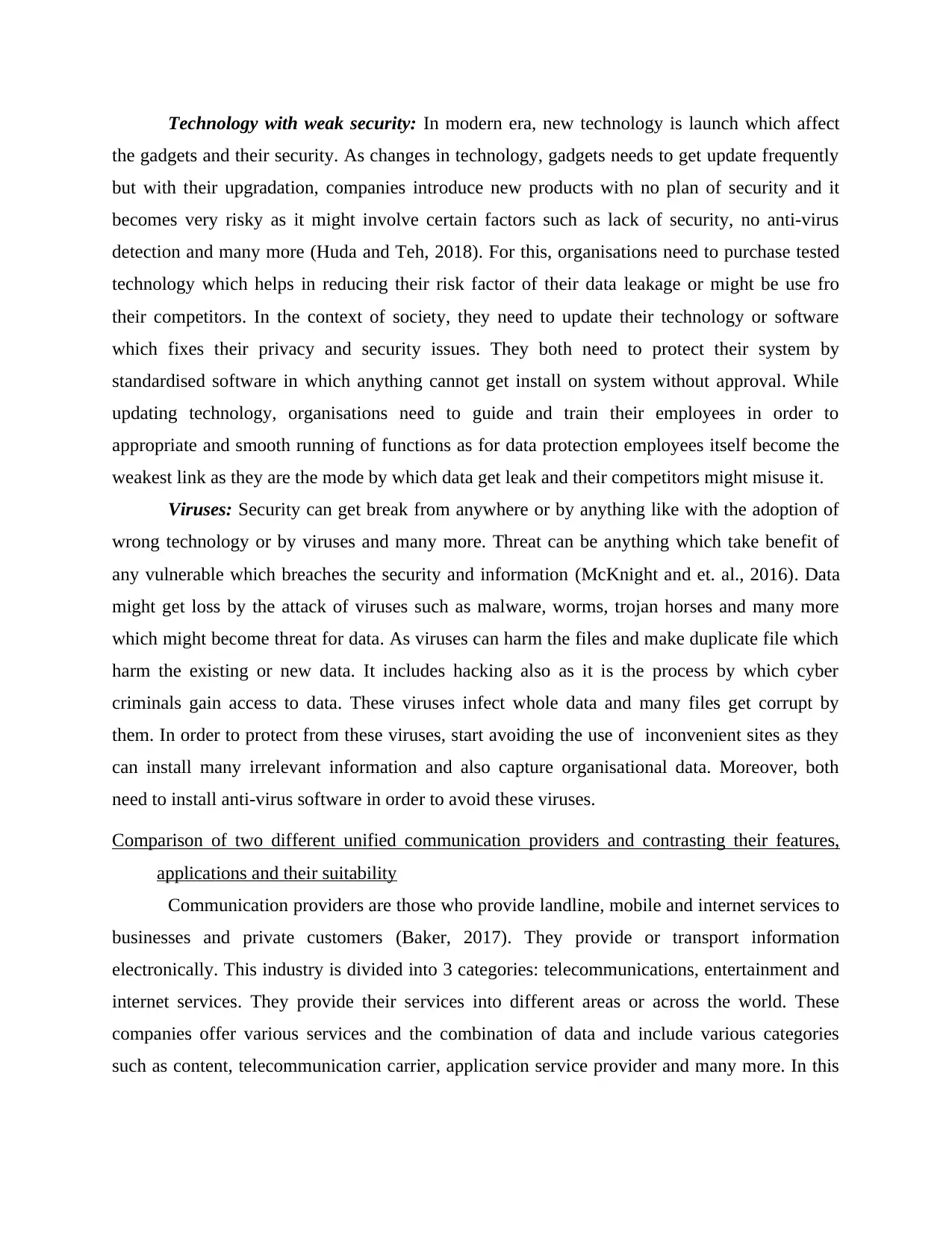
Technology with weak security: In modern era, new technology is launch which affect
the gadgets and their security. As changes in technology, gadgets needs to get update frequently
but with their upgradation, companies introduce new products with no plan of security and it
becomes very risky as it might involve certain factors such as lack of security, no anti-virus
detection and many more (Huda and Teh, 2018). For this, organisations need to purchase tested
technology which helps in reducing their risk factor of their data leakage or might be use fro
their competitors. In the context of society, they need to update their technology or software
which fixes their privacy and security issues. They both need to protect their system by
standardised software in which anything cannot get install on system without approval. While
updating technology, organisations need to guide and train their employees in order to
appropriate and smooth running of functions as for data protection employees itself become the
weakest link as they are the mode by which data get leak and their competitors might misuse it.
Viruses: Security can get break from anywhere or by anything like with the adoption of
wrong technology or by viruses and many more. Threat can be anything which take benefit of
any vulnerable which breaches the security and information (McKnight and et. al., 2016). Data
might get loss by the attack of viruses such as malware, worms, trojan horses and many more
which might become threat for data. As viruses can harm the files and make duplicate file which
harm the existing or new data. It includes hacking also as it is the process by which cyber
criminals gain access to data. These viruses infect whole data and many files get corrupt by
them. In order to protect from these viruses, start avoiding the use of inconvenient sites as they
can install many irrelevant information and also capture organisational data. Moreover, both
need to install anti-virus software in order to avoid these viruses.
Comparison of two different unified communication providers and contrasting their features,
applications and their suitability
Communication providers are those who provide landline, mobile and internet services to
businesses and private customers (Baker, 2017). They provide or transport information
electronically. This industry is divided into 3 categories: telecommunications, entertainment and
internet services. They provide their services into different areas or across the world. These
companies offer various services and the combination of data and include various categories
such as content, telecommunication carrier, application service provider and many more. In this
the gadgets and their security. As changes in technology, gadgets needs to get update frequently
but with their upgradation, companies introduce new products with no plan of security and it
becomes very risky as it might involve certain factors such as lack of security, no anti-virus
detection and many more (Huda and Teh, 2018). For this, organisations need to purchase tested
technology which helps in reducing their risk factor of their data leakage or might be use fro
their competitors. In the context of society, they need to update their technology or software
which fixes their privacy and security issues. They both need to protect their system by
standardised software in which anything cannot get install on system without approval. While
updating technology, organisations need to guide and train their employees in order to
appropriate and smooth running of functions as for data protection employees itself become the
weakest link as they are the mode by which data get leak and their competitors might misuse it.
Viruses: Security can get break from anywhere or by anything like with the adoption of
wrong technology or by viruses and many more. Threat can be anything which take benefit of
any vulnerable which breaches the security and information (McKnight and et. al., 2016). Data
might get loss by the attack of viruses such as malware, worms, trojan horses and many more
which might become threat for data. As viruses can harm the files and make duplicate file which
harm the existing or new data. It includes hacking also as it is the process by which cyber
criminals gain access to data. These viruses infect whole data and many files get corrupt by
them. In order to protect from these viruses, start avoiding the use of inconvenient sites as they
can install many irrelevant information and also capture organisational data. Moreover, both
need to install anti-virus software in order to avoid these viruses.
Comparison of two different unified communication providers and contrasting their features,
applications and their suitability
Communication providers are those who provide landline, mobile and internet services to
businesses and private customers (Baker, 2017). They provide or transport information
electronically. This industry is divided into 3 categories: telecommunications, entertainment and
internet services. They provide their services into different areas or across the world. These
companies offer various services and the combination of data and include various categories
such as content, telecommunication carrier, application service provider and many more. In this
Paraphrase This Document
Need a fresh take? Get an instant paraphrase of this document with our AI Paraphraser
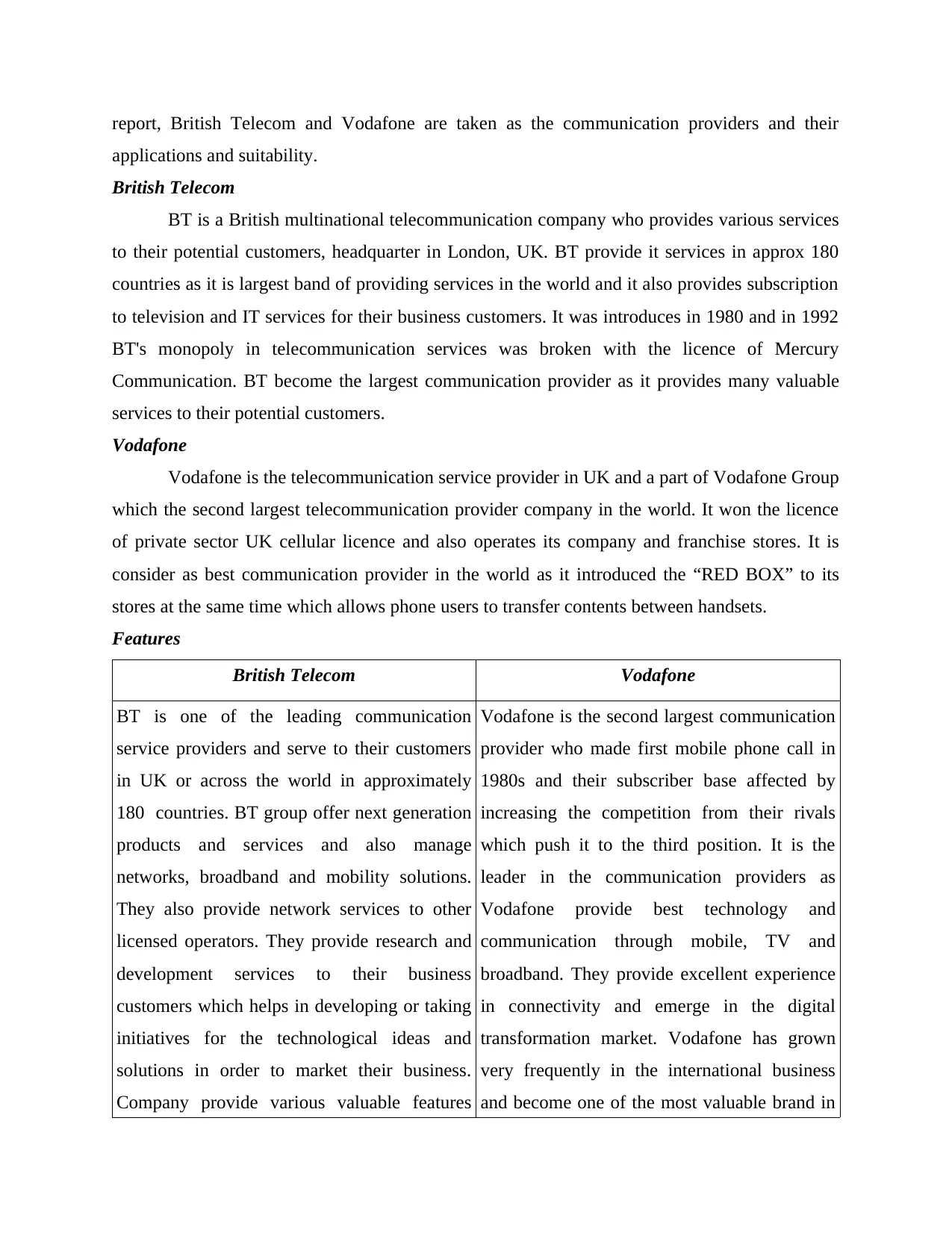
report, British Telecom and Vodafone are taken as the communication providers and their
applications and suitability.
British Telecom
BT is a British multinational telecommunication company who provides various services
to their potential customers, headquarter in London, UK. BT provide it services in approx 180
countries as it is largest band of providing services in the world and it also provides subscription
to television and IT services for their business customers. It was introduces in 1980 and in 1992
BT's monopoly in telecommunication services was broken with the licence of Mercury
Communication. BT become the largest communication provider as it provides many valuable
services to their potential customers.
Vodafone
Vodafone is the telecommunication service provider in UK and a part of Vodafone Group
which the second largest telecommunication provider company in the world. It won the licence
of private sector UK cellular licence and also operates its company and franchise stores. It is
consider as best communication provider in the world as it introduced the “RED BOX” to its
stores at the same time which allows phone users to transfer contents between handsets.
Features
British Telecom Vodafone
BT is one of the leading communication
service providers and serve to their customers
in UK or across the world in approximately
180 countries. BT group offer next generation
products and services and also manage
networks, broadband and mobility solutions.
They also provide network services to other
licensed operators. They provide research and
development services to their business
customers which helps in developing or taking
initiatives for the technological ideas and
solutions in order to market their business.
Company provide various valuable features
Vodafone is the second largest communication
provider who made first mobile phone call in
1980s and their subscriber base affected by
increasing the competition from their rivals
which push it to the third position. It is the
leader in the communication providers as
Vodafone provide best technology and
communication through mobile, TV and
broadband. They provide excellent experience
in connectivity and emerge in the digital
transformation market. Vodafone has grown
very frequently in the international business
and become one of the most valuable brand in
applications and suitability.
British Telecom
BT is a British multinational telecommunication company who provides various services
to their potential customers, headquarter in London, UK. BT provide it services in approx 180
countries as it is largest band of providing services in the world and it also provides subscription
to television and IT services for their business customers. It was introduces in 1980 and in 1992
BT's monopoly in telecommunication services was broken with the licence of Mercury
Communication. BT become the largest communication provider as it provides many valuable
services to their potential customers.
Vodafone
Vodafone is the telecommunication service provider in UK and a part of Vodafone Group
which the second largest telecommunication provider company in the world. It won the licence
of private sector UK cellular licence and also operates its company and franchise stores. It is
consider as best communication provider in the world as it introduced the “RED BOX” to its
stores at the same time which allows phone users to transfer contents between handsets.
Features
British Telecom Vodafone
BT is one of the leading communication
service providers and serve to their customers
in UK or across the world in approximately
180 countries. BT group offer next generation
products and services and also manage
networks, broadband and mobility solutions.
They also provide network services to other
licensed operators. They provide research and
development services to their business
customers which helps in developing or taking
initiatives for the technological ideas and
solutions in order to market their business.
Company provide various valuable features
Vodafone is the second largest communication
provider who made first mobile phone call in
1980s and their subscriber base affected by
increasing the competition from their rivals
which push it to the third position. It is the
leader in the communication providers as
Vodafone provide best technology and
communication through mobile, TV and
broadband. They provide excellent experience
in connectivity and emerge in the digital
transformation market. Vodafone has grown
very frequently in the international business
and become one of the most valuable brand in
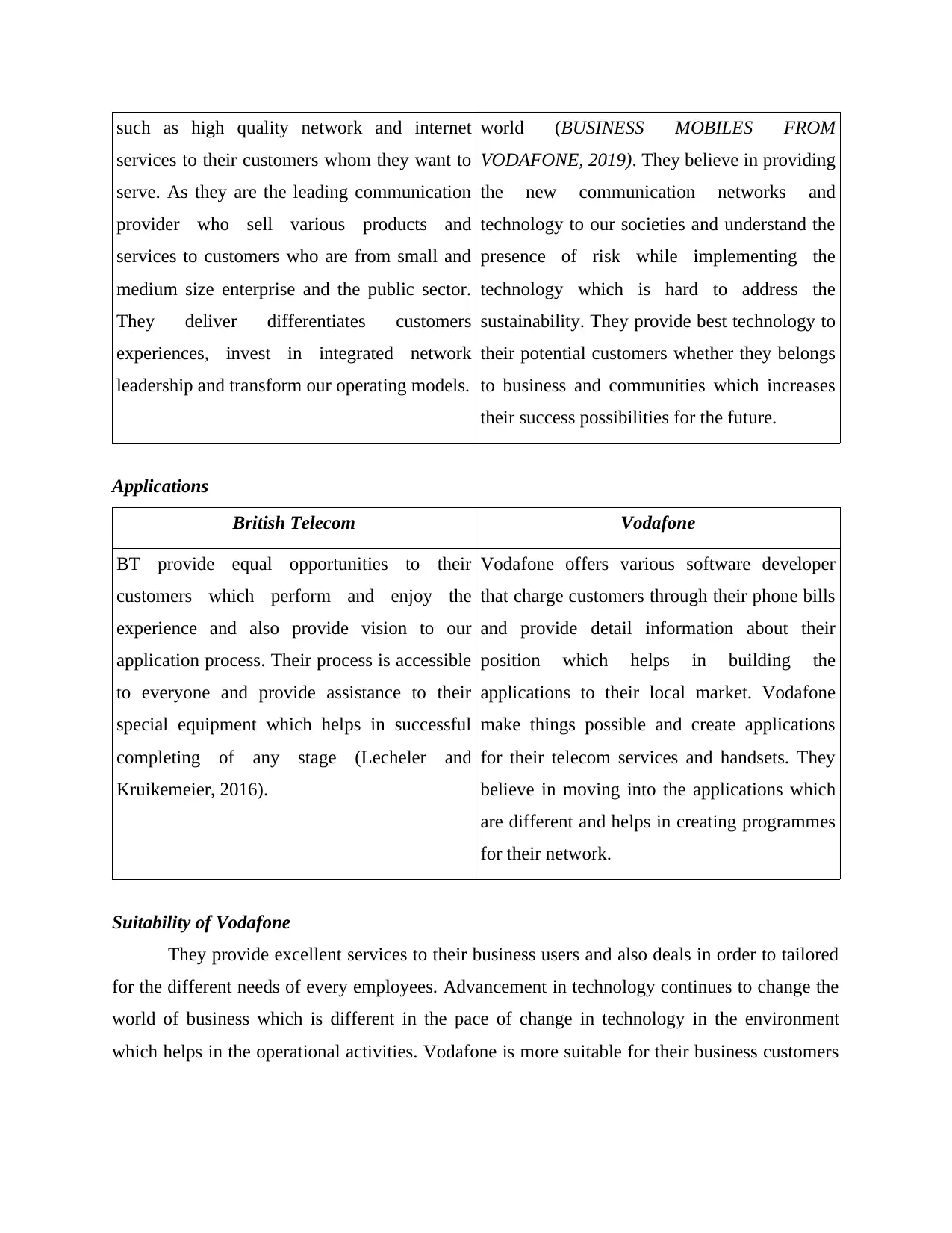
such as high quality network and internet
services to their customers whom they want to
serve. As they are the leading communication
provider who sell various products and
services to customers who are from small and
medium size enterprise and the public sector.
They deliver differentiates customers
experiences, invest in integrated network
leadership and transform our operating models.
world (BUSINESS MOBILES FROM
VODAFONE, 2019). They believe in providing
the new communication networks and
technology to our societies and understand the
presence of risk while implementing the
technology which is hard to address the
sustainability. They provide best technology to
their potential customers whether they belongs
to business and communities which increases
their success possibilities for the future.
Applications
British Telecom Vodafone
BT provide equal opportunities to their
customers which perform and enjoy the
experience and also provide vision to our
application process. Their process is accessible
to everyone and provide assistance to their
special equipment which helps in successful
completing of any stage (Lecheler and
Kruikemeier, 2016).
Vodafone offers various software developer
that charge customers through their phone bills
and provide detail information about their
position which helps in building the
applications to their local market. Vodafone
make things possible and create applications
for their telecom services and handsets. They
believe in moving into the applications which
are different and helps in creating programmes
for their network.
Suitability of Vodafone
They provide excellent services to their business users and also deals in order to tailored
for the different needs of every employees. Advancement in technology continues to change the
world of business which is different in the pace of change in technology in the environment
which helps in the operational activities. Vodafone is more suitable for their business customers
services to their customers whom they want to
serve. As they are the leading communication
provider who sell various products and
services to customers who are from small and
medium size enterprise and the public sector.
They deliver differentiates customers
experiences, invest in integrated network
leadership and transform our operating models.
world (BUSINESS MOBILES FROM
VODAFONE, 2019). They believe in providing
the new communication networks and
technology to our societies and understand the
presence of risk while implementing the
technology which is hard to address the
sustainability. They provide best technology to
their potential customers whether they belongs
to business and communities which increases
their success possibilities for the future.
Applications
British Telecom Vodafone
BT provide equal opportunities to their
customers which perform and enjoy the
experience and also provide vision to our
application process. Their process is accessible
to everyone and provide assistance to their
special equipment which helps in successful
completing of any stage (Lecheler and
Kruikemeier, 2016).
Vodafone offers various software developer
that charge customers through their phone bills
and provide detail information about their
position which helps in building the
applications to their local market. Vodafone
make things possible and create applications
for their telecom services and handsets. They
believe in moving into the applications which
are different and helps in creating programmes
for their network.
Suitability of Vodafone
They provide excellent services to their business users and also deals in order to tailored
for the different needs of every employees. Advancement in technology continues to change the
world of business which is different in the pace of change in technology in the environment
which helps in the operational activities. Vodafone is more suitable for their business customers
⊘ This is a preview!⊘
Do you want full access?
Subscribe today to unlock all pages.

Trusted by 1+ million students worldwide
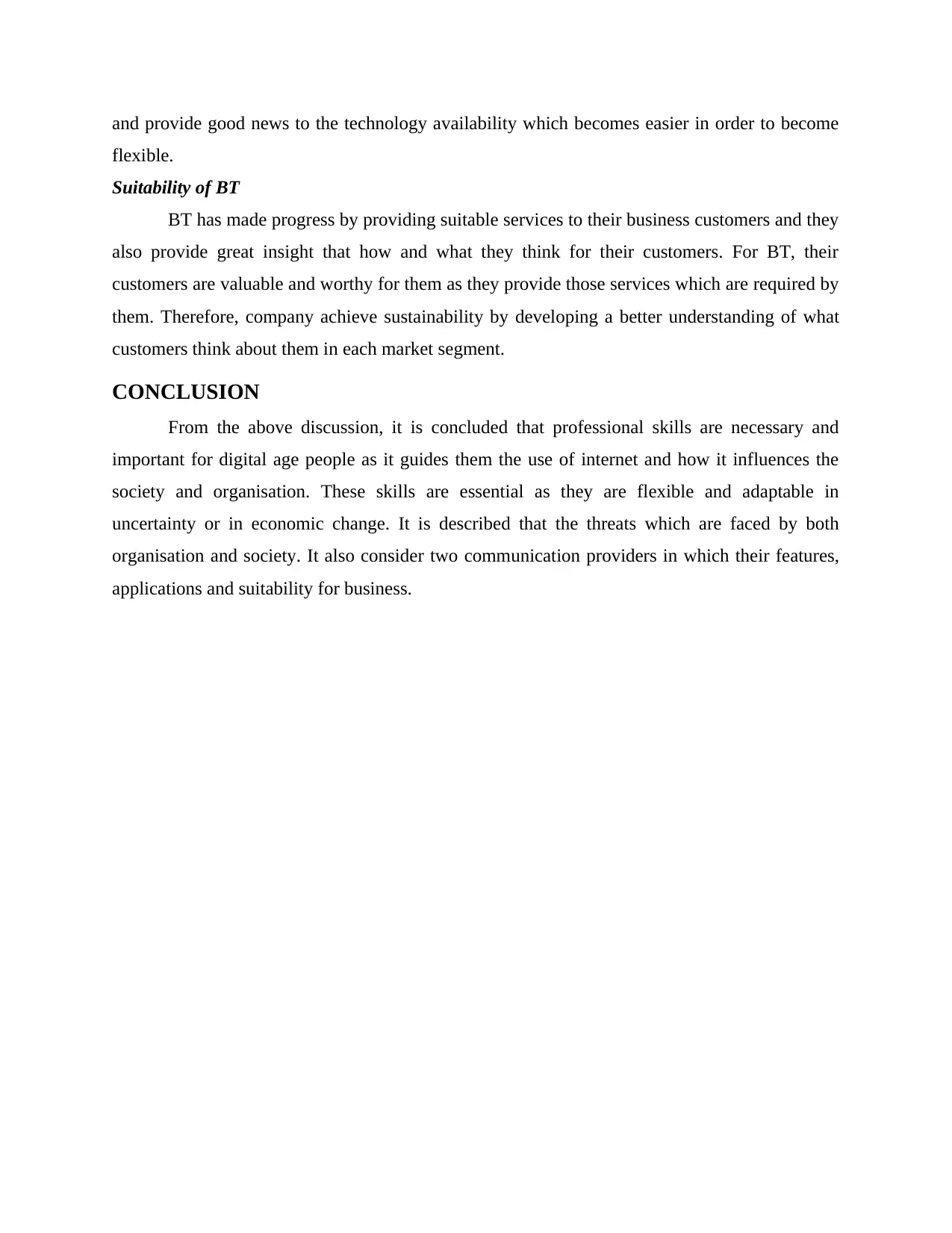
and provide good news to the technology availability which becomes easier in order to become
flexible.
Suitability of BT
BT has made progress by providing suitable services to their business customers and they
also provide great insight that how and what they think for their customers. For BT, their
customers are valuable and worthy for them as they provide those services which are required by
them. Therefore, company achieve sustainability by developing a better understanding of what
customers think about them in each market segment.
CONCLUSION
From the above discussion, it is concluded that professional skills are necessary and
important for digital age people as it guides them the use of internet and how it influences the
society and organisation. These skills are essential as they are flexible and adaptable in
uncertainty or in economic change. It is described that the threats which are faced by both
organisation and society. It also consider two communication providers in which their features,
applications and suitability for business.
flexible.
Suitability of BT
BT has made progress by providing suitable services to their business customers and they
also provide great insight that how and what they think for their customers. For BT, their
customers are valuable and worthy for them as they provide those services which are required by
them. Therefore, company achieve sustainability by developing a better understanding of what
customers think about them in each market segment.
CONCLUSION
From the above discussion, it is concluded that professional skills are necessary and
important for digital age people as it guides them the use of internet and how it influences the
society and organisation. These skills are essential as they are flexible and adaptable in
uncertainty or in economic change. It is described that the threats which are faced by both
organisation and society. It also consider two communication providers in which their features,
applications and suitability for business.
Paraphrase This Document
Need a fresh take? Get an instant paraphrase of this document with our AI Paraphraser
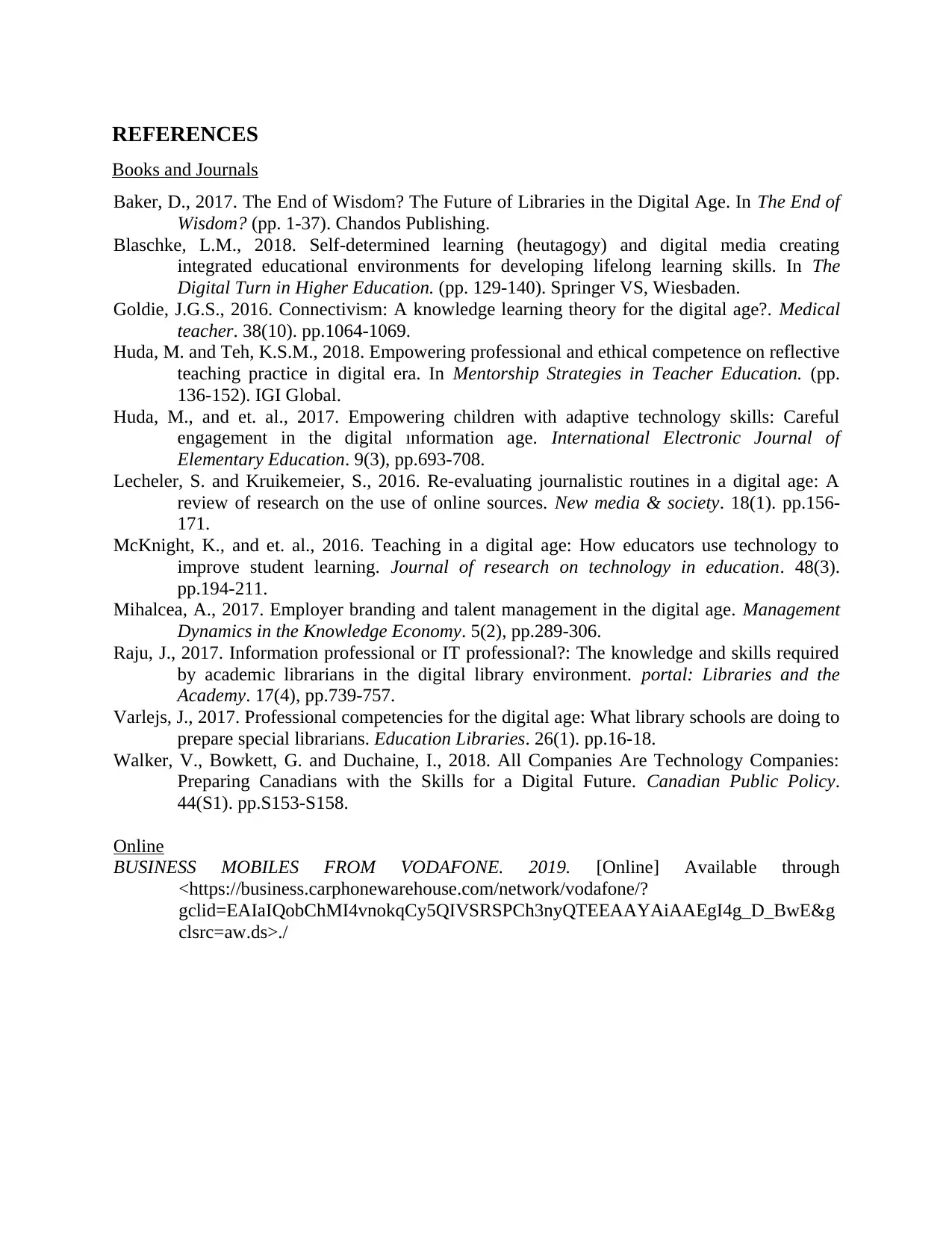
REFERENCES
Books and Journals
Baker, D., 2017. The End of Wisdom? The Future of Libraries in the Digital Age. In The End of
Wisdom? (pp. 1-37). Chandos Publishing.
Blaschke, L.M., 2018. Self-determined learning (heutagogy) and digital media creating
integrated educational environments for developing lifelong learning skills. In The
Digital Turn in Higher Education. (pp. 129-140). Springer VS, Wiesbaden.
Goldie, J.G.S., 2016. Connectivism: A knowledge learning theory for the digital age?. Medical
teacher. 38(10). pp.1064-1069.
Huda, M. and Teh, K.S.M., 2018. Empowering professional and ethical competence on reflective
teaching practice in digital era. In Mentorship Strategies in Teacher Education. (pp.
136-152). IGI Global.
Huda, M., and et. al., 2017. Empowering children with adaptive technology skills: Careful
engagement in the digital ınformation age. International Electronic Journal of
Elementary Education. 9(3), pp.693-708.
Lecheler, S. and Kruikemeier, S., 2016. Re-evaluating journalistic routines in a digital age: A
review of research on the use of online sources. New media & society. 18(1). pp.156-
171.
McKnight, K., and et. al., 2016. Teaching in a digital age: How educators use technology to
improve student learning. Journal of research on technology in education. 48(3).
pp.194-211.
Mihalcea, A., 2017. Employer branding and talent management in the digital age. Management
Dynamics in the Knowledge Economy. 5(2), pp.289-306.
Raju, J., 2017. Information professional or IT professional?: The knowledge and skills required
by academic librarians in the digital library environment. portal: Libraries and the
Academy. 17(4), pp.739-757.
Varlejs, J., 2017. Professional competencies for the digital age: What library schools are doing to
prepare special librarians. Education Libraries. 26(1). pp.16-18.
Walker, V., Bowkett, G. and Duchaine, I., 2018. All Companies Are Technology Companies:
Preparing Canadians with the Skills for a Digital Future. Canadian Public Policy.
44(S1). pp.S153-S158.
Online
BUSINESS MOBILES FROM VODAFONE. 2019. [Online] Available through
<https://business.carphonewarehouse.com/network/vodafone/?
gclid=EAIaIQobChMI4vnokqCy5QIVSRSPCh3nyQTEEAAYAiAAEgI4g_D_BwE&g
clsrc=aw.ds>./
Books and Journals
Baker, D., 2017. The End of Wisdom? The Future of Libraries in the Digital Age. In The End of
Wisdom? (pp. 1-37). Chandos Publishing.
Blaschke, L.M., 2018. Self-determined learning (heutagogy) and digital media creating
integrated educational environments for developing lifelong learning skills. In The
Digital Turn in Higher Education. (pp. 129-140). Springer VS, Wiesbaden.
Goldie, J.G.S., 2016. Connectivism: A knowledge learning theory for the digital age?. Medical
teacher. 38(10). pp.1064-1069.
Huda, M. and Teh, K.S.M., 2018. Empowering professional and ethical competence on reflective
teaching practice in digital era. In Mentorship Strategies in Teacher Education. (pp.
136-152). IGI Global.
Huda, M., and et. al., 2017. Empowering children with adaptive technology skills: Careful
engagement in the digital ınformation age. International Electronic Journal of
Elementary Education. 9(3), pp.693-708.
Lecheler, S. and Kruikemeier, S., 2016. Re-evaluating journalistic routines in a digital age: A
review of research on the use of online sources. New media & society. 18(1). pp.156-
171.
McKnight, K., and et. al., 2016. Teaching in a digital age: How educators use technology to
improve student learning. Journal of research on technology in education. 48(3).
pp.194-211.
Mihalcea, A., 2017. Employer branding and talent management in the digital age. Management
Dynamics in the Knowledge Economy. 5(2), pp.289-306.
Raju, J., 2017. Information professional or IT professional?: The knowledge and skills required
by academic librarians in the digital library environment. portal: Libraries and the
Academy. 17(4), pp.739-757.
Varlejs, J., 2017. Professional competencies for the digital age: What library schools are doing to
prepare special librarians. Education Libraries. 26(1). pp.16-18.
Walker, V., Bowkett, G. and Duchaine, I., 2018. All Companies Are Technology Companies:
Preparing Canadians with the Skills for a Digital Future. Canadian Public Policy.
44(S1). pp.S153-S158.
Online
BUSINESS MOBILES FROM VODAFONE. 2019. [Online] Available through
<https://business.carphonewarehouse.com/network/vodafone/?
gclid=EAIaIQobChMI4vnokqCy5QIVSRSPCh3nyQTEEAAYAiAAEgI4g_D_BwE&g
clsrc=aw.ds>./
1 out of 11
Related Documents
Your All-in-One AI-Powered Toolkit for Academic Success.
+13062052269
info@desklib.com
Available 24*7 on WhatsApp / Email
![[object Object]](/_next/static/media/star-bottom.7253800d.svg)
Unlock your academic potential
Copyright © 2020–2026 A2Z Services. All Rights Reserved. Developed and managed by ZUCOL.





